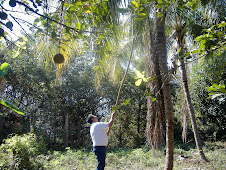
The Food Justice Movement Ignored
Published March 24, 2009 @ 02:00PM PT
Sustainable food's in the news lately. And some think that this recent New York Times piece ("Is a Food Revolution Now in Season?") was, in ways, a hit piece on our movement. They paint a picture of the Organic Elite - Alice Waters, Michael Pollan, and big wigs at Stonyfield and Whole Foods - but make them seem as though they've got their heads in the clouds as they call for tripling what we pay for kids' school lunches or changing our policy to create decentralized, regional food networks. They provide the viewpoint of the "other side," saying:
But advocates of conventional agriculture argue that organic farming simply can’t provide enough food because the yields tend to be lower than those for crops grown with chemical fertilizer.
“We think there’s a place for organic, but don’t think we can feed ourselves and the world with organic,” says Rick Tolman, chief executive of the National Corn Growers Association. “It’s not as productive, more labor-intensive and tends to be more expensive.”
That's fine, to throw in a quote from the National Corn Growers Association. What's NOT fine is to fail to mention that the quote is NOT TRUE. Organics is more expensive because people are willing to pay more for it. We as consumers therefore think of it as more expensive, but is it? Certainly it is expensive for a conventional farmer to transition to organic but once their soil life is healthy and the beneficial insects have moved in to eat the pests, quite frankly I've never seen any analysis of the cost of growing organic vs. the cost of growing conventional.
What I have seen are numbers from the Rodale Institute showing that organic yields beat conventional yields in most years after the first five years of converting to organic. And if a farmer were to grow corn and soy using Rodale's methods, I'd imagine it's probably cheaper than conventional farming. Sure, you'd have to buy seeds for your cover crop, but you need 2/3 less oil overall, and you can skip on the fertilizer and pesticides. With their methods, it's not terribly labor intensive because the cover crop (once you kill it and plant your actual crop) serves as a mulch to suppress weed growth. On the organic farms I've visited, much of the extra labor required is for weeding.
I don't have the data to fully refute the National Corn Growers quote (other than the bit about yields) but my point here is that the article never gives an organic farmer a chance to respond. They let the quote stand on its own, leading the reader to believe that the advocates of organics are perhaps just a bunch of Berkeley hippies with no idea how the real world works.
The other "money quote" in the piece is this:
But Ms. Childs worries that some of the activists’ recommendations for buying fresh, local or organic food cannot be adopted by many Americans because those foods may be too expensive. “By singling out certain lifestyles and foods, it’s diminishing very good quality nutrition sources,” she says. “Frozen goods, canned goods, they are not bad things. What’s important is that people eat well, within their means.”
“We’d all love to live on a farm in Vermont, right?” she adds.
This one really irks me. I spend much of my time engaged with the food justice/community food security side of our movement. That's the part of the movement that believes that all people have a right to healthy food and works to see it happen. That's the part of the movement that's getting very little press right now, as organics steal all the headines. While I love seeing organics and sustainability in the news, my hunch is that we can be marginalized if they paint us as an elite with our heads in the clouds.
This past year, I've visited my fair share of organic farms, but I've also visited a homeless shelter in Philadelphia that trains people to work in food service and helps them find jobs. I've written about Growing Power, an urban farm in Milwaukee that empowers its youth corps to grow healthy food in a sustainable way and to provide that food in an area of the city that would otherwise be a food desert. I've spoken with Austin's Sustainable Food Center, that teaches free healthy cooking classes to low income folks and sends them home with a bag of groceries after each class. In my own city, the International Rescue Committee set up the first farmers market that accepts food stamps and located it in a blighted area. Because the neighborhood of the new farmers' market has a high population of immigrants, they make sure to sell foods used in various types of ethnic cuisine.
There's a food justice movement out there and it's big. So we're not all Slow Food fanatics who dine on $120 a plate multi-course meals of locally grown food. That represents some people, sure, but it's not all of us. And it's about time that the food justice movement starts taking back the headlines.
-xx-Museo-Nacional-de-Arte.jpg)

































No comments:
Post a Comment